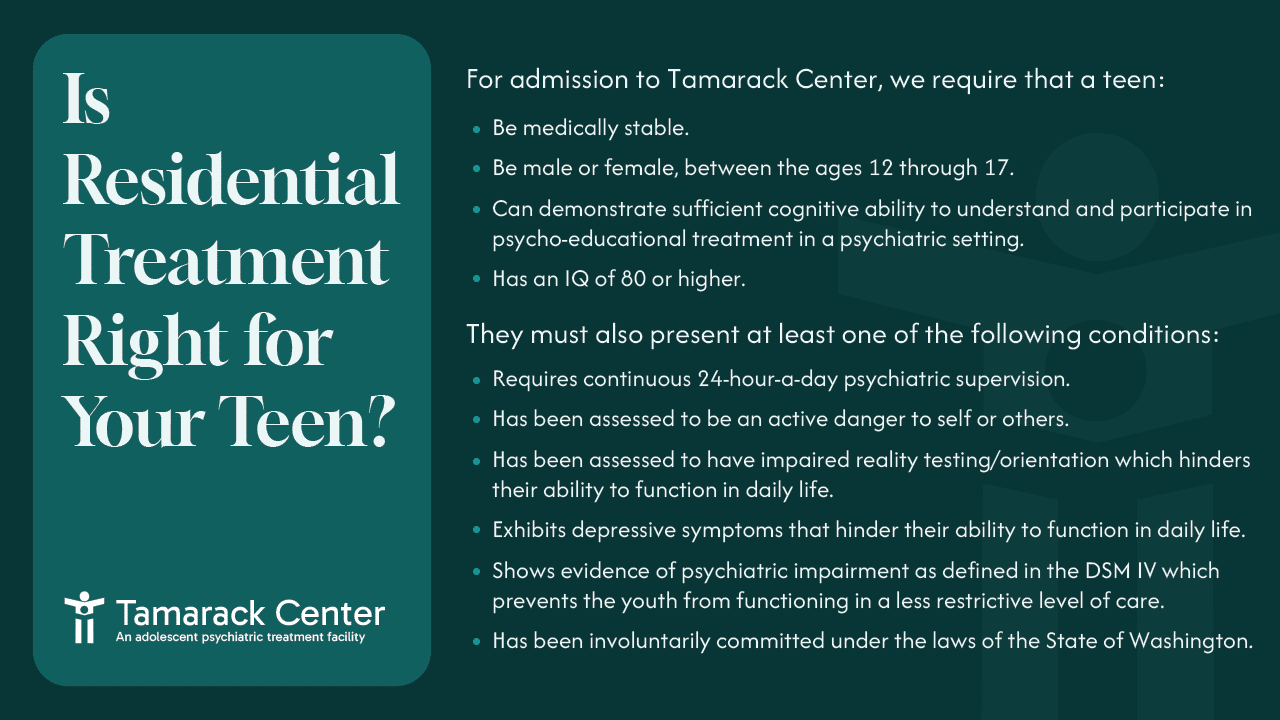Choosing to admit your teen into residential treatment (or inpatient treatment) is not an easy decision. In many cases, it’s the best option for their care and well-being and it can be.
A residential treatment center provides a safe, structured environment for teens struggling with mental health conditions. Residential treatment programs provide intensive support, supervision, and treatment.
Tamarack Center in Spokane, WA, is a residential mental health treatment center for teens. We’ve been providing a quiet refuge of treatment and hope for these children and their families since 1984.
Here, we’ll explore a few details to consider as you determine the best course of action.
Is your child struggling with mental health? Contact Tamarack Center to find out how we can help.
Residential Treatment at Tamarack Center
Residential treatment facilities can help to reduce the impact of mental health issues before they become problematic — and can help to break the cycle of harmful behaviors that lead to needing more intensive interventions
For admission to Tamarack Center, we require that a teen:
- Be medically stable
- Between the ages of 12 through 17
- Can demonstrate sufficient cognitive ability to understand and participate in psycho-educational treatment in a psychiatric setting
- Has an IQ of 80 or higher
They must also present at least one of the following conditions:
- Requires continuous 24-hour-a-day psychiatric supervision
- Has been assessed to be an active danger to self
- Has been evaluated to have impaired reality testing/orientation which hinders their ability to function in daily life
- Exhibits depressive symptoms that hinder their ability to function in daily life
- Shows evidence of psychiatric impairment as defined in the DSM IV which prevents the youth from functioning in a less restrictive level of care
- Has been involuntarily committed under the laws of the Washington state
7 Ways to Know if Residential Treatment is Right for Your Teen

1. Risk of Self-Harm
It’s important to take any signs of potential self-harm from your teen seriously. Residential treatment may be called for if they directly threaten to hurt themselves or take their own life. Indirect threats such as “I wish I wasn’t here anymore,” or “Nothing matters,” may also indicate suicidal thoughts.
If ensuring the safety of your teen and those around them requires more supervision than can be provided, a residential treatment facility should be considered.
2. Functional Impairment
If your teen’s mental health struggles seriously impair their ability to function in everyday life, residential treatment should be considered.
These impairments could include:
- Inability to care for themself at a minimal level, or an inability to complete even simple tasks.
- Running away from home, or frequent engagement in risky behaviors.
- Inability to attend school regularly, or consistently failing grades.
- Self-isolation, or withdrawal from most social activities.
- Difficult, broken, or contentious relationships with family members and friends.
- Getting in trouble with law enforcement and the justice system.
3. Mental Health Deterioration
If your teen’s mental health symptoms continue to worsen, even after outpatient treatment, residential treatment centers might be called for. Worsening symptoms are usually a sign that more intensive, immersive treatment may be required, or that a teen needs treatment in a controlled environment.
Residential programs can provide both. A residential facility can offer more frequent treatments, an environment with minimal triggers and distractions, and a guided transition back into the outside world.
Evidence-based therapeutic modalities provided in residential care programs, such as Dialectical behavior therapy, have been proven effective and well-received by teens in treatment. DBT can help teens better manage their emotions, decrease anxiety, develop better relationships, and function better in everyday life.
4. Unsafe, Unstable, or Hostile Home Environment
When a teen’s home life is chaotic, abusive, or otherwise unsupportive, outpatient programs may be less effective.
Outpatient programs depend on patients being able to practice new coping skills. An unstable, unsafe environment offers frequent triggers, high levels of anxiety, and increased stress, making it difficult to develop new skills.
A lack of support structures can undermine treatment programs and leave a teen feeling isolated.
Residential treatment centers offer a safe, supportive environment where new skills can be practiced with supervision and encouragement.
5. Level of Parental Support
There may be times when parents struggle with their own health issues and can’t offer the support a teen with mental health concerns requires.
Residential treatment centers like Tamarack Center provide structured family therapy sessions as part of their treatment programs. This helps families support their teen’s progress when they transition back to outpatient care and minimizes the chances of regression.
6. Willingness
Unless a teen is given a court order, teens can’t forced into treatment.
Their willingness to attend, and actively participate in the residential programs, can contribute a lot to the success of treatment.
Teens may be reluctant when first presented with the idea of residential treatment centers. It can seem like being “sent away” or seen as a punishment.
To gauge a teen’s willingness to participate in a residential treatment program, talk with them calmly about their mental health issues. Empathize your desire to support and help them. Pay close attention to what they say and validate their feelings without judgment.
Introduce the idea of residential care, emphasizing benefits such as structured routines, therapy, and support. Explain positive outcomes such as improved mood and better coping skills. Talk about any concerns that come up, like missing school or being disconnected from friends. Let them know that residential programs offer academic support and often coordinate with the teen’s school to make sure they stay current with their studies.
If they still have questions, contact the residential treatment center. They’ll be happy to answer any questions and provide in-depth information.
Tamarack Center – A Quiet Refuge of Treatment and Hope
Tamarack Center has been providing effective, compassionate residential treatment for forty years. We provide a safe environment, structured daily schedules, and recreational activities. Our staff includes a full-time child psychiatrist, pediatrician, clinical psychologist, Master’s level therapists, and a Master’s level teacher who provides for the residents’ education during their stay.
Our treatments involve multiple modalities, including Dialectical behavior therapy (DBT) and medication management.
We view families as key members of our treatment team. Every resident is assigned a Family Specialist at the time of admission, who follows your child and serves as the point of contact regarding their health and progress.
We have weekly family therapy sessions held during a resident’s treatment. We keep the family closely involved in developing discharge criteria and treatment goals.
Tamarack Center does have a few conditions that will automatically exclude a teen from admission:
- A teen cannot be so physically challenged that they can’t care for themself.
- A teen cannot have a history or level of aggression that could compromise the safety of the milieu.
- A teen cannot exhibit behaviors that require an acute psychiatric hospital level of care.
We help adolescents and teens break the cycle of self-destructive behaviors. Contact Tamarack Center to see how we can help.

